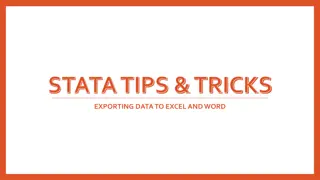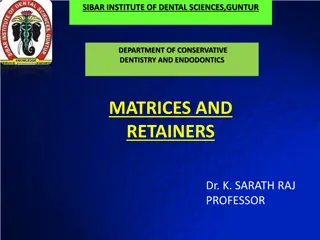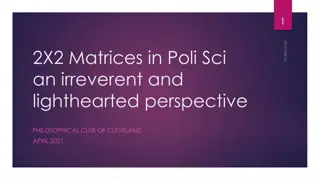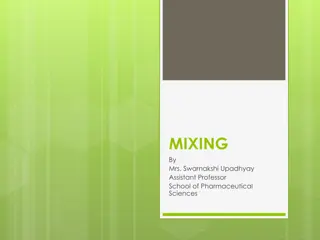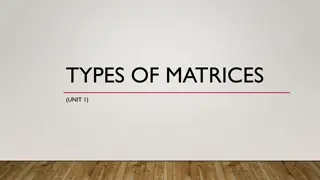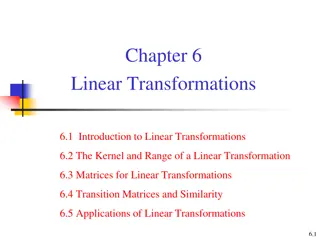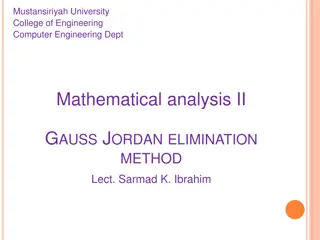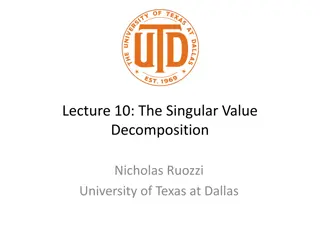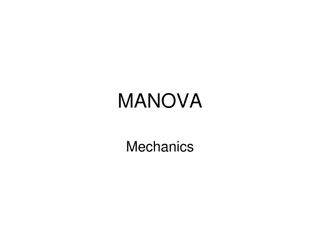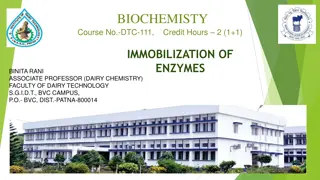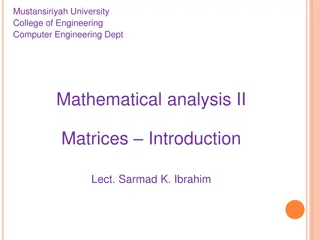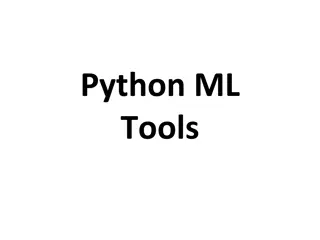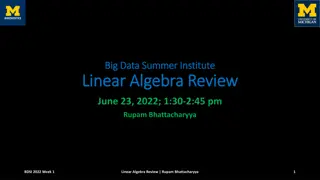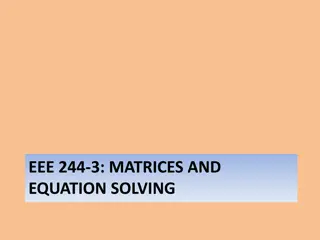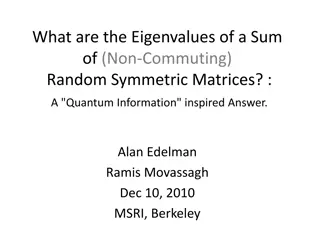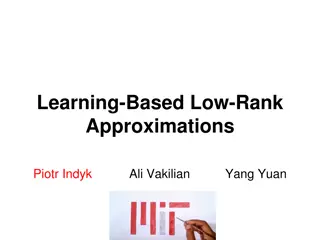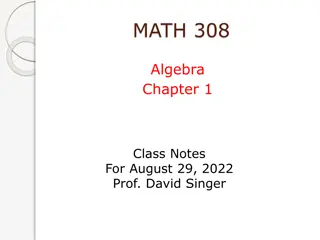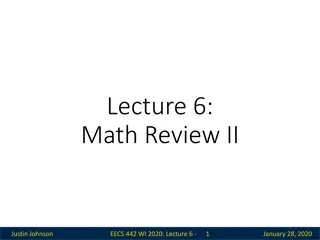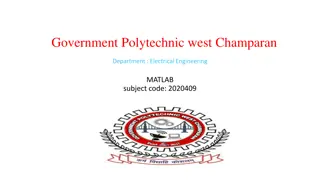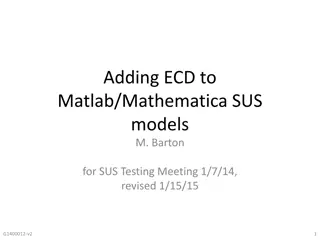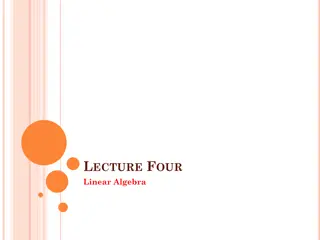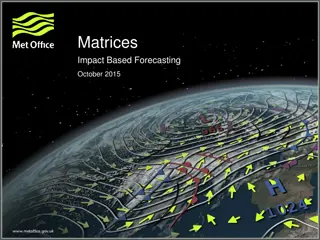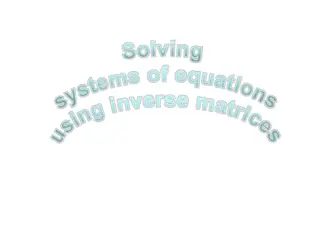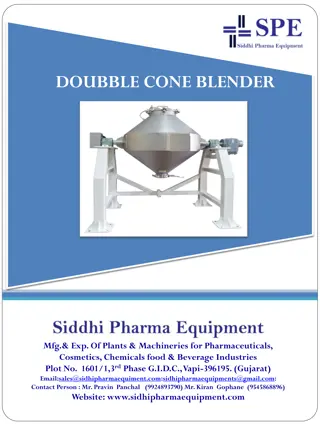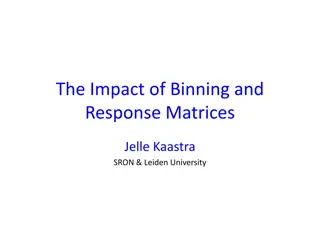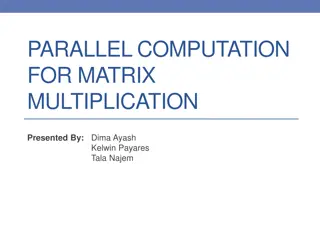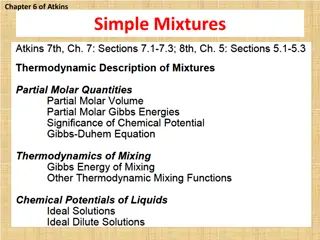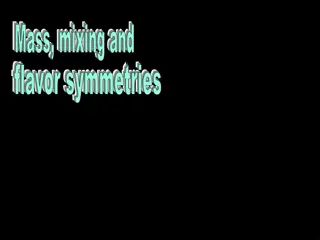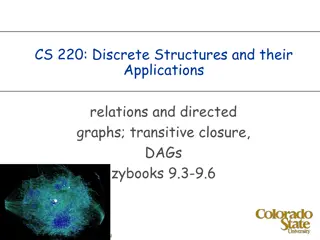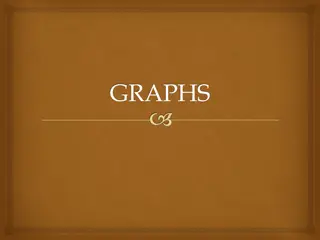AQA Level 2 Certificate in Further Maths
The AQA Level 2 Certificate in Further Maths is designed for high-achieving students to develop advanced skills in algebra, geometry, calculus, matrices, trigonometry, functions, and graphs. The course covers topics like number fractions, decimals, algebraic fractions, coordinate geometry, calculus,
7 views • 9 slides
Exporting STATA Results to Excel Using PutExcel Feature
Learn how to utilize the PutExcel feature in STATA to effortlessly export your results to an Excel file. With PutExcel, you can export matrices, stored results, images, estimation tables, and even add formulas for calculations. This tool streamlines the process of transferring statistical data to Ex
6 views • 32 slides
Matrix Systems in Restorative Dentistry: A Comprehensive Overview
Understanding the role of matrices and retainers in restorative dentistry is crucial for achieving optimal results in direct restorative procedures. This article covers the definitions, ideal requirements, functions, and parts of matrices, providing valuable insights into their importance and usage
1 views • 55 slides
2x2 Matrices in Political Science: An Irreverent Perspective
Delve into the world of 2x2 matrices in political science with a humorous twist, uncovering their foibles, fallacies, and effectiveness. From youthful rigidity to complex behavioral continuums, this unconventional take on matrices unveils their application in various scenarios like spouse choices, b
2 views • 34 slides
Mixing Processes in Pharmaceutical Sciences
Mixing is a fundamental operation in pharmaceutical sciences, involving blending different substances to achieve uniformity. This process is crucial for various applications, such as chemical reactions, suspensions, and emulsions. The types of mixtures, factors affecting mixing efficiency, and diffe
0 views • 23 slides
Matrices: Types, Definitions, and Operations
Matrices are ordered arrays used to express linear equations. Learn about types, definition, equality, and operations like addition, subtraction, and multiplication. Discover matrix equality and the transpose of a matrix, including symmetric and skew-symmetric matrices.
2 views • 17 slides
Linear Transformations and Matrices in Mathematics
Linear transformations play a crucial role in the study of vector spaces and matrices. They involve mapping vectors from one space to another while maintaining certain properties. This summary covers the introduction to linear transformations, the kernel and range of a transformation, matrices for l
1 views • 85 slides
Fluid Mixing in Chemical Reactions
The problems associated with fluid mixing during reactions are crucial for fast reactions in both homogeneous and heterogeneous systems. These issues involve the degree of segregation of the fluid and the timing of mixing. Concepts like RTD are intertwined with fluid mixing, affecting the behavior o
2 views • 46 slides
Matrices in Precalculus: Order, Augmented Matrix, and Row-Echelon Form
Delve into the world of matrices in Precalculus with a focus on identifying matrix orders, creating augmented matrices for systems of equations, transforming matrices into row-echelon form, and solving linear equations using matrices. Explore elementary row operations, row-echelon form, and reduced
2 views • 37 slides
Gaussian Elimination Method in Linear Algebra
Gaussian Elimination and Gauss-Jordan Elimination are methods used in linear algebra to transform matrices into reduced row echelon form. Wilhelm Jordan and Clasen independently described Gauss-Jordan elimination in 1887. The process involves converting equations into augmented matrices, performing
4 views • 14 slides
Singular Value Decomposition
The Singular Value Decomposition (SVD) is a powerful factorization method for matrices, extending the concept of eigenvectors and eigenvalues to non-symmetric matrices. This decomposition allows any matrix to be expressed as the product of three matrices: two orthogonal matrices and a diagonal matri
0 views • 35 slides
MANOVA: Mechanics and Applications
MANOVA is a multivariate generalization of ANOVA, examining the relationship between multiple dependent variables and factors simultaneously. It involves complex statistical computations, matrix operations, and hypothesis testing to analyze the effects of independent variables on linear combinations
1 views • 16 slides
Immobilization of Enzymes in Biochemistry
Enzyme immobilization involves confining enzyme molecules to a distinct phase from substrates and products, attaching them to solid matrices for enhanced specificity and reduced inhibition. Inert polymers or inorganic materials are used as carrier matrices with methods like physical adsorption onto
0 views • 24 slides
Hessian-Free Optimization in Neural Networks
A detailed exploration of Hessian-Free (HF) optimization method in neural networks, delving into concepts such as error reduction, gradient-to-curvature ratio, Newton's method, curvature matrices, and strategies for avoiding inverting large matrices. The content emphasizes the importance of directio
0 views • 31 slides
Introduction to Matrices in Mathematical Analysis
Matrices play a crucial role in simplifying complex systems of equations and are well-suited for systematic mathematical treatments and computer computations. This introduction covers the definition of matrices, their properties such as size and notation, and various types of matrices including colu
0 views • 77 slides
Python ML Tools: NumPy and SciPy
Python is a powerful language for machine learning, but it can be slow for numerical computations. NumPy and SciPy are essential packages for working with matrices efficiently in Python. NumPy supports features crucial for machine learning, such as fast numerical computations and high-level math fun
2 views • 11 slides
Linear Algebra Review for Big Data Summer Institute
Join Rupam Bhattacharyya at the Big Data Summer Institute for a comprehensive review of linear algebra concepts. Explore topics such as matrix notation, special matrices, shapes of matrices, and matrix operations. Gain valuable insights for applications in big data analysis and machine learning.
0 views • 18 slides
Matrices and Solving Equations in Electrical Engineering
Matrices play a crucial role in solving linear equations in Electrical Engineering applications. Learn about matrix structures, special matrices, inverses, transposes, system of linear equations, and solving methods using MATLAB/Python. Explore the application of matrices in solving voltage-current
2 views • 24 slides
Affinity Chromatography: A Breakthrough in Biochemical Research
Affinity chromatography, developed in the 1930s by A. Wilhelm Tiselius, is a vital technique for studying enzymes and proteins. It relies on the specific affinity between biochemical compounds and utilizes matrices like agarose for binding sites. Ligands such as amino and hydroxyl groups play crucia
1 views • 27 slides
Rank in Matrices
Rank in matrices represents the maximum number of independent columns, with implications for pivot columns, basic variables, and free variables. The rank of a matrix is essential for determining its properties and dependencies. Learn about rank-deficient matrices, basic versus free variables, and mo
0 views • 7 slides
Eigenvalues in Quantum Information
Explore the eigenvalues of sums of non-commuting random symmetric matrices in the context of quantum information. Delve into the complexities of eigenvalue distributions in various scenarios, including random diagonals, orthogonal matrices, and symmetric matrix sums. Gain insights into classical and
0 views • 24 slides
Fun and Educational Color Mixing Experiment for Elementary Students
Engage elementary school students in a hands-on color mixing experiment using primary colors to create secondary colors. The activity involves visual demonstrations, color paddles, and mixing colored goo in bags to understand color blending and create unique color combinations. Through this interact
0 views • 7 slides
Learning-Based Low-Rank Approximations and Linear Sketches
Exploring learning-based low-rank approximations and linear sketches in matrices, including techniques like dimensionality reduction, regression, and streaming algorithms. Discusses the use of random matrices, sparse matrices, and the concept of low-rank approximation through singular value decompos
0 views • 13 slides
Algebra: Operations, Patterns, and More
Explore the fundamental concepts of algebra through sets, operations, patterns, axioms, identities, examples, inverses, groups, modular arithmetic, and matrices. Delve into the world of square matrices and gain insights into various algebraic structures.
0 views • 20 slides
General Equilibrium Models and Social Accounting Matrices
General Equilibrium Models (CGE) and Social Accounting Matrices (SAM) provide a comprehensive framework for analyzing economies and policies. This analysis delves into how CGE models help simulate various economic scenarios and their link to SAM, which serves as a key data input for the models. The
0 views • 50 slides
Math Fundamentals: Matrices and Vectors in EECS 442
Delve into the world of matrices and vectors with a focus on floating-point math, IEEE standards, vector operations, and matrix manipulation in the context of EECS 442 lectures by Justin Johnson. Explore foundational concepts such as concatenation, transpose, cross product, dot product, and the nuan
0 views • 58 slides
MATLAB Basics for Electrical Engineering Students
In this instructional content from the Government Polytechnic West Champaran Department of Electrical Engineering, students are introduced to the fundamentals of MATLAB. Topics covered include transposing matrices, concatenating matrices, matrix generators, arrays, entering matrices, and manipulatin
0 views • 48 slides
Advancements in Adding ECD to Matlab/Mathematica SUS Models
Enhancements in incorporating Eddy Current Damping (ECD) into Matlab and Mathematica SUS models for HAUX/HTTS testing have been made to streamline the integration process. This includes addressing challenges with damping implementation, exporting symbolic matrices, and utilizing state-space formalis
0 views • 11 slides
Linear Algebra Concepts: Systems of Equations, Orthogonal Matrix, and Quadratic Forms
Explore the concepts of simultaneous linear equations, homogeneous and non-homogeneous systems, orthogonal matrices, and various types of quadratic forms in linear algebra. Learn about the characteristics of positive definite, semi-positive definite, and negative definite quadratic forms represented
0 views • 7 slides
Hazard Matrices and Impact-Based Forecasting
Hazard matrices are essential tools for coordinating emergency preparedness and response by categorizing primary, secondary, and tertiary effects of hazards. Impact matrices help organizations assess risks and determine potential impacts of events, allowing for better planning and mitigation strateg
0 views • 12 slides
Science of Color Mixing
Discover the fascinating world of color mixing, from the composition of pure white light to the creation of different hues through additive and subtractive methods. Explore how our eyes perceive colors, the role of RGB systems in computers, and the traditional RYB model in art. Unveil the secrets be
0 views • 8 slides
Solving Systems of Equations using Inverse Matrices
Learn how to solve systems of equations using inverse matrices, find the determinant of matrices, use matrix multiplication, calculate the inverse matrix, and apply it to solve simultaneous equations. Explore examples and applications in investment scenarios.
0 views • 14 slides
Siddhi Pharma Equipment - Double Cone Blender for Pharmaceutical, Food, Chemical Industries
Siddhi Pharma Equipment specializes in manufacturing and exporting plants and machineries for pharmaceuticals, cosmetics, chemicals, food, and beverage industries. They offer the Double Cone Blender, ideal for mixing and blending various products in industries such as pharmaceutical, nutraceutical,
0 views • 4 slides
Solid Mixing Mechanisms and Equipment
Solid mixing involves processes like convective, shear, and diffusive mixing which randomize dissimilar particles in a system. Factors affecting solid mixing include particle size, distribution, and properties like density and elasticity. Various mechanisms like tumbling mixers are used for solid mi
0 views • 16 slides
Insights into Binning and Response Matrices for Spectral Analysis
Understanding the impact of binning and response matrices in spectral analysis, including energy bin properties, flux evaluation techniques, assumptions, and strategies for improvement. The discussion delves into challenges and solutions for accurate data interpretation and modeling in high-resoluti
0 views • 20 slides
Parallel Computation for Matrix Multiplication
Matrix multiplication is a fundamental operation with diverse applications across scientific research. Parallel computation for matrix multiplication involves distributing the computational workload over multiple processors, improving efficiency. Different algorithms have been developed for multiply
0 views • 36 slides
Thermodynamics of Mixing in Atkins: Chapter 6 Overview
Unveil the intricacies of Chapter 6 from Atkins' book on Simple Mixtures. Delve into topics like Partial Molar Volume, Gibbs Energies, Chemical Potential, Gibbs-Duhem Equation, Thermodynamics of Mixing, and more. Explore key concepts such as Gibbs Energy of Mixing, Raoult's Law, Molecular Interpreta
0 views • 22 slides
Neutrino Mass, Mixing, and Flavor Symmetries
Neutrino physics involves studying mass, mixing, and flavor symmetries, which present new challenges when dealing with multiple neutrinos. The discussion includes neutrino states, mixing matrices, flavor content, vacuum mixing, standard parametrization, mixing angles, global fits, and the Tri-bimaxi
0 views • 59 slides
Directed Graphs and Adjacency Matrices in Discrete Structures
Explore the concepts of binary relations, directed graphs, adjacency matrices, transitive closure, and walks in the context of discrete structures. Learn how vertices, edges, in-degrees, out-degrees, and self-loops are defined in directed graphs. Understand the importance of adjacency matrices in re
1 views • 28 slides
Graphs in Mathematics and Computer Science
Graphs in mathematics and computer science are abstract data types used to represent relationships between objects. They consist of vertices connected by edges, which can be directed or undirected. Graphs find applications in various fields like electric circuits, networks, and transportation system
0 views • 19 slides

